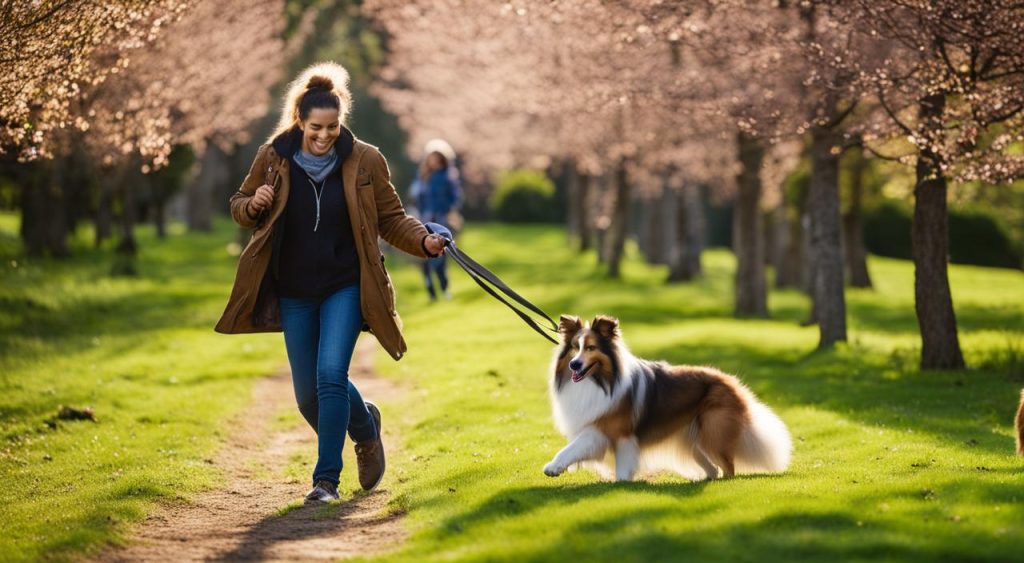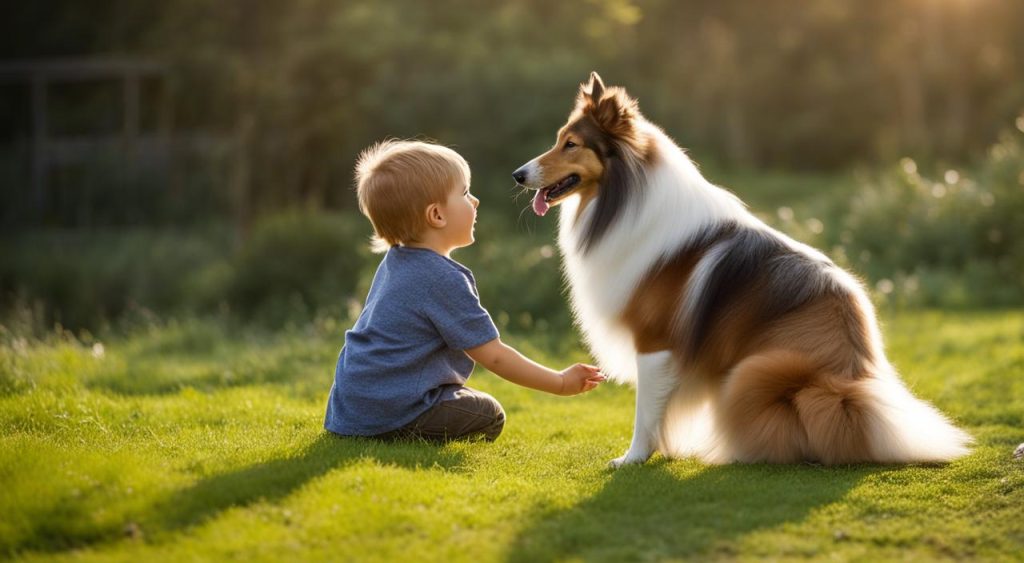Shetland Sheepdogs, also known as Shelties, have moderate exercise needs and require approximately 1 hour of exercise per day. If you are considering adding a Shetland Sheepdog to your family, it’s important to understand their exercise requirements and how to keep them active and healthy.
Shelties enjoy daily walks, interactive play sessions, and mental stimulation. They thrive on activities that tap into their herding instincts, such as fetch or obedience training, as it provides them with both physical and mental exercise. In addition to regular walks, Shelties also excel in various dog sports and enjoy participating in activities that challenge their agility and intelligence.
However, it’s important to avoid overexertion, especially in hot weather, as Shelties can be sensitive to heat. It’s crucial to ensure they have access to shade and fresh water during exercise to prevent overheating or dehydration.
It’s worth noting that Sheltie puppies have different exercise requirements compared to adults. While they are growing, their exercise should be gentle and age-appropriate. Puppies benefit from short play sessions throughout the day and should avoid excessive jumping or activities that may strain their developing bones and joints. Consult with your vet for guidance on the exercise needs of your individual Sheltie.
By providing your Shetland Sheepdog with regular exercise and engaging activities, you can help them lead a happy, healthy, and well-rounded life.
Key Takeaways:
- Shetland Sheepdogs require approximately 1 hour of exercise per day.
- Daily walks, interactive play sessions, and mental stimulation are essential for their well-being.
- Engaging them in activities that tap into their herding instincts can provide both physical and mental exercise.
- Avoid overexertion and be mindful of their sensitivity to heat.
- Sheltie puppies have different exercise requirements compared to adults and should engage in age-appropriate activities.
Shetland Sheepdog Temperament and Training
Shetland Sheepdogs are known for their intelligence, loyalty, and affectionate nature. They form strong bonds with their families and are generally good with children and other pets when properly socialized. A well-trained Sheltie can be a delightful and obedient companion.
“Shelties are highly trainable and respond well to positive reinforcement training methods.”
Their herding instincts make them naturally attentive and responsive to commands. With their sharp intellect, Shelties are quick learners and enjoy mental stimulation. Early socialization and basic obedience training are crucial for shaping their behavior and ensuring they develop into well-behaved and well-adjusted dogs.
“Shelties enjoy learning new tricks and tasks, and their trainability makes them suitable for various dog sports and activities.”
Using positive reinforcement techniques, such as treats, praises, and rewards, will motivate and encourage Shelties in their training. They thrive when given a job to do and appreciate having a sense of purpose. Regular training sessions, along with consistency and patience, will help in harnessing their potential and keeping them mentally engaged.
It’s important to remember that every Sheltie is unique, and their training needs may vary. Some may excel in obedience training, while others may gravitate towards agility or herding activities. Understanding their individual strengths and interests can help tailor the training to suit their specific needs.
In summary, Shelties have a temperament that combines intelligence, loyalty, and affection. They are highly trainable and responsive to positive reinforcement methods. By providing them with proper socialization and engaging in regular training sessions, you can unlock their full potential and enjoy a well-mannered and talented companion.
Shetland Sheepdog Grooming and Health
Shetland Sheepdogs have a beautiful double coat that requires regular grooming to keep it healthy and free from matting. Weekly brushing is necessary to prevent tangles and remove loose hair. During shedding seasons, more frequent brushing may be required. Bathing should be done infrequently, approximately every 2-3 months. Regular tooth brushing and nail trimming are also important parts of their grooming routine.
“Proper grooming not only keeps your Shetland Sheepdog looking their best, but it also contributes to their overall health and well-being,” advises Dr. Sarah Thompson, a veterinarian at Shetland Pet Clinic. “Regular brushing helps to distribute natural oils throughout the coat, keeping it moisturized and reducing the risk of skin issues. It also allows you to check for any skin abnormalities or signs of parasites.”
Shelties are generally a healthy breed, but like any dog, they may be prone to certain health conditions. “Common health concerns in Shetland Sheepdogs include hip dysplasia, eye issues such as progressive retinal atrophy (PRA), heart problems, and skin diseases,” explains Dr. Thompson. “It’s important to monitor their health closely and schedule regular check-ups with your vet to detect any potential issues early on.”
To ensure your Shetland Sheepdog lives a long and healthy life, Dr. Thompson recommends maintaining a balanced diet, providing regular exercise, and keeping up with preventive care such as vaccinations and parasite control. “Your vet can provide personalized advice and guidance on your Sheltie’s specific healthcare needs.”
Remember, a well-groomed and healthy Shetland Sheepdog is a happy companion for you and your family.
Conclusion
In conclusion, Shetland Sheepdogs are intelligent and loyal dogs that require approximately 1 hour of exercise per day. Their moderate exercise needs can be met through daily walks, interactive play sessions, and mentally stimulating activities. Training and socialization are vital for their well-being, as they thrive on positive reinforcement and enjoy learning new tricks and tasks.
In addition to their exercise requirements, Shelties have a beautiful double coat that requires regular grooming to keep it healthy and free from tangles. Weekly brushing, along with infrequent bathing, tooth brushing, and nail trimming, is essential for their grooming routine.
While Shetland Sheepdogs are generally a healthy breed, it’s important to be aware of potential health issues such as hip dysplasia, eye problems, and skin diseases. Regular check-ups with a veterinarian and monitoring their overall health are important for their well-being.
By meeting their exercise needs, providing mental stimulation, and maintaining their grooming and health care, Shetland Sheepdogs can lead happy and healthy lives as beloved companions for their families.





